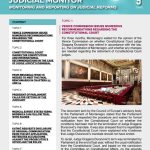
Number 9: Judicial Monitor – Monitoring and Reporting on Judicial Reforms
09/07/2025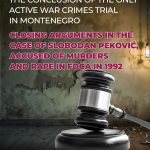
THE CONCLUSION OF THE ONLY ACTIVE WAR CRIMES TRIAL IN MONTENEGRO – Closing arguments in the case of Slobodan Peković, accused of murders and rape in Foča in 1992
11/07/202530 YEARS SINCE THE GENOCIDE IN SREBRENICA – MONTENEGRO OWES THE ESTABLISHMENT OF A DAY OF REMEMBRANCE
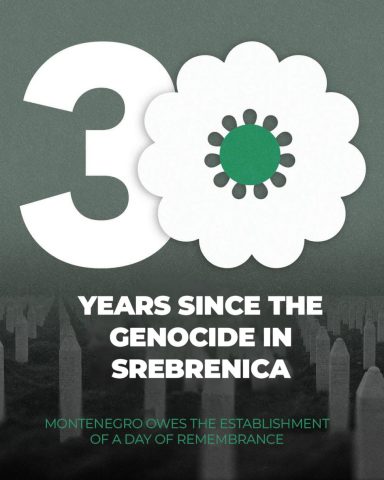
Tomorrow marks 30 years since the genocide in Srebrenica, the most massive crime committed on European soil since World War II.
The undersigned Montenegrin non-governmental organizations, the Bosniak Council, and civil society activists pay tribute to the victims, express solidarity with the survivors and their families, and protest the failure of Montenegrin authorities to declare a Day of Remembrance for the victims of the Srebrenica genocide, despite last year’s United Nations General Assembly resolution, which Montenegro supported.
We remind the public that exactly one year ago, 76 Montenegrin NGOs demanded that Montenegro establish a Day of Remembrance for the Srebrenica genocide and ensure its official commemoration, in accordance with the United Nations Resolution declaring July 11 as the International Day of Reflection and Remembrance of the 1995 Srebrenica Genocide, the 2021 Resolution of the Parliament of Montenegro on the Srebrenica Genocide, and the 2009 Declaration of the Parliament of Montenegro accepting the European Parliament’s resolution on Srebrenica.
However, Prime Minister Milojko Spajić’s government and the Montenegrin Parliament, chaired by Andrija Mandić, have done nothing to implement this. Worse yet, we are not aware of a single member of the Government or Parliament who has even submitted such an initiative.
It is important to recall that judgments of international and national courts have established that members of the Army of the Republika Srpska (VRS), between July 11 and 19, 1995, deliberately and systematically killed over 8,000 unarmed Bosniaks, aged between 14 and 70. More than 600 children were murdered, the youngest being a baby born on July 13, 1995, who was exhumed from a mass grave near Srebrenica in 2012.
The ICTY and the International Residual Mechanism for Criminal Tribunals have convicted 21 individuals for crimes in Srebrenica, including seven for genocide, based on more than 1,500 testimonies and around 28,000 pieces of evidence. In Bosnia and Herzegovina, 31 people have been convicted for the same crimes, 14 of them for genocide; five in Serbia (members of the special police unit “Scorpions”), and two in Croatia. The International Court of Justice (ICJ) also determined that genocide was committed in Srebrenica and that the Republic of Serbia is responsible for failing to prevent it, although it had both the capacity and obligation to do so. This ruling, while formally directed at Serbia, also morally implicates Montenegro, which was part of the state union with Serbia at the time.
We emphasize that whether genocide occurred is a matter of law, not politics. In determining accountability for the Srebrenica genocide, 46 judges from 34 countries participated in two-instance proceedings before the ICTY. Fifteen judges from different countries were involved in the ICJ judgment. Denial of the Srebrenica genocide is a denial of international judicial authority.
Montenegro has adopted the 2009 Declaration accepting the European Parliament’s resolution on Srebrenica and the 2021 Resolution on the Srebrenica Genocide, which strongly condemned the crime. Montenegro also voted in favor of the UN resolution establishing the International Day of Remembrance for the Srebrenica Genocide and dismissed its Minister of Justice, Human and Minority Rights, Vladimir Leposavić, for relativizing the genocide. These were steps toward a more secure future for Montenegro and the region within the European Union—steps to be proud of.
On the other hand, Montenegro’s current government includes Serbian nationalist parties that, unfortunately, deny the genocide and use every opportunity to humiliate the victims, insisting on a nationalist “competition in suffering.” An irresponsible urge to prioritize Serbian victims at all costs led to the Montenegrin Parliament’s expedited adoption of the Resolution condemning the genocide in Jasenovac in June 2024—an undiplomatic move that dealt a blow to relations with Croatia and endangered EU accession negotiations.
In recent months, the Parliament also ignored a request from the Higher State Prosecutor’s Office to lift the immunity of an MP over hate speech—a troubling incident unworthy of a country that claims adherence to the rule of law in its EU membership bid.
We reiterate our firm opposition to the policy of “crime for crime,” condemn the practice of adopting “counter-resolutions,” and refuse to allow future generations to grow up indoctrinated with hatred and a sense of provincial inferiority that pits them against the world—starting with their closest neighbors.
We demand that Montenegro assume responsibility for shaping a future in which new generations will be spared further suffering. The victims of crimes—of all faiths and nations—oblige us to stand for justice, truth, and reconciliation, and to build a society that respects and protects every person, regardless of national, religious, or ethnic identity.
We invite everyone to join us on July 11 at 10:00 a.m. in Podgorica, at the Memorial Park for Civilian Victims in Pobrežje, to commemorate the Srebrenica Remembrance Day.
Signatories:
- Human Rights Action (HRA), Tea Gorjanc Prelević
- Center for Civic Education (CGO), Daliborka Uljarević
- Center for Women’s and Peace Education ANIMA, Ervina Dabižinović
- Bosniak Council in Montenegro, Suljo Mustafić
- Bosniak Forum in Montenegro, Mirsad Rastoder
- Center for Culture – Bihor, Semir Škrijelj
- Alfa Center, Miloš Perović
- Agora Femina, Maja Bogojević
- Agency for Local Democracy, Kerim Međedović
- Active Zone, Miloš Marković
- Alumni Association of the Law Faculty, Nebojša Vučinić
- Antifascists of Cetinje, Filip Kuzman
- Association SPEKTRA, Jovan Ulićević
- Balkan Sector, Aner Salihović
- Better Future, Ahmed Bektešević
- Bona fidae, Pljevlja, Sabina Talović
- CAZAS, Mišo Pejković
- Center for Investigative Journalism of Montenegro (CIN CG), Milka Tadić Mijović
- Center for Affirmation of the RE Population – CAREP, Nardi Ahmetović
- Center for Democracy and Human Rights (CEDEM), Nevenka Vuksanović
- Center for Democratic Transition (CDT), Milica Kovačević
- Center for Training and Education, Aleksandra Radoman Kovačević
- Center for Protection and Research of Birds (CZIP), Jovana Janjušević
- Center for Women’s Rights (CŽP), Maja Raičević
- Center for Monitoring and Research (CeMI), Zlatko Vujović
- Center for Roma Initiatives, Fana Delija
- Center for Development of NGOs, Zorana Marković
- Center for Economic and European Studies (CEES), Nenad Vujošević
- Center for Civil Liberties (CEGAS), Marija Popović Kalezić
- Center for Multimedia Production (CEZAM), Blagota Marunović
- Montenegrin PEN Center, Adnan Čirgić
- Montenegrin LGBTIQ Association Queer Montenegro, Staša Baštrica
- Montenegrin Committee of Lawyers for Human Rights, Velija Murić
- Montenegrin Women’s Lobby, Aida Petrović
- Montenegrin Philological Society, Milan Marković
- Montenegrin Association for Political Science (MoPSA), Olivera Komar
- Montenegrins of Danilovgrad, Alek Barović
- Montenegrin Helsinki Committee (CHO), Miodrag Vlahović
- Montenegrin Forum, Jelena Marković
- Montenegrin Cultural Circle, Cetinje, Sreten Zeković
- Children of Montenegro, Sabra Decević
- Association of Montenegrin Publishers, Dr. Vladimir Vojinović
- Martin Schneider-Jacoby Association – MSJA, Zenepa Lika
- Eduko Center, Almedina Dodić
- eMDe Alliance – Community of Montenegrin Associations in Germany, Emira Mustajbasić Ličina
- ERA – LGBTI Equal Rights Alliance for the Western Balkans and Turkey, Danijel Kalezić
- Civic Initiative “May 21st,” Rade Bojović
- Civic Alliance, Milan Radović
- Gradionica, Goran Janković
- Green Home, Azra Vuković
- Husein Pasha – Pljevlja, Denijal Geljić
- Husein Pasha, Emir Pilav
- Ikre, Rožaje, Velida Hodžić
- Youth Initiative for Human Rights, Amina Murić
- Initiative for Regional Cooperation of Montenegro (Igman Initiative), Andro Martinović
- Media Institute of Montenegro (IMCG), Olivera Nikolić
- Institute for Gender Policy “Dulcinea” Ulcinj, Hadixha Gjoni
- Institute for Socio-Political Research “Analitico”, Ana Nenezić
- Ipso Facto, Milena Popović Samardžić
- Juventas, Ivana Vujović
- Korifer Theater – Kolašin, Zoran Rakočević
- The House, Pavić Radović
- Heritage House, Valon Kovaçi
- LINK – Montenegrin Harm Reduction Network, Ranko Dacić
- Mare Mare, Dubravka Raičević
- Monitoring Group Ulcinj – Mogul, Xhemal Peroviq
- Monte Lingva, Jadranka Đurković
- Bridge of Culture, Podgorica, Ivan Jokanović
- Youth Activism Network, David Vukićević
- Ant, Rožaje, Munevera Sutović
- Multimedial, Željko Đukić
- Science and Technology Hub KNOWLEDGE – EPISTEME, Ivan Martinović
- New Horizon, Ulcinj, Nazif Velić
- Optimists, Ana Milović Jasikovac
- Municipal Association for Multiple Sclerosis, Bijelo Polje, Lidija Guberinić
- Movement for the Development of Tuzi, Mustafa Pepić
- Platform for Women’s Excellence – Sofija, Rebeka Čilović
- Prima, Aida Perović
- Legal Representative, Budislav Budo Minić
- Empty Space, Marija Backović
- First Women’s Ecological Movement in Montenegro – Ecopatriotism, Ivana Čogurić Rašović
- Punta Institute, Ulcinj, Admir Gjoni
- Development of Vranj, Tuzi
- Roma Youth Organization “Walk With Us – Phiren Amenca,” Elvis Beriša
- Safe Women’s House, Budislavka Mira Saveljić
- System, Neda Radović
- Sociological Center of Montenegro – SOCEN, Nikoleta Đukanović
- Social Justice, Marija Mijušković Kastratović
- SOS Hotline for Women and Children Victims of Violence, Plav, Esmeralda Šuvakić
- SOS Hotline for Women and Children Victims of Violence – Ulcinj, Hatixhe Nelaj
- SOS Hotline Podgorica, Biljana Zeković
- STEGA, Vladimir Nikaljević
- Student Organization Adamas
- TNT, Dragan Lučić
- Association of LBTQ Women “Stana,” Ana Dedivanović
- Association of Fine Artists of Montenegro, Svetlana Dragojević
- Association of Youth with Disabilities of Montenegro, Marina Vujačić
- Association of Lawyers of Montenegro, Branislav Radulović
- Association of History Teachers HIPMONT, Miloš Vukanović
- Parents’ Association OAZA, Rasema Hekalo
- Association “Štrpci – Against Oblivion,” Demir Ličina
- Association of Women “Local Quality,” Aldijana Đonović Madžar
- Association for Support of Roma and Egyptians, Berane, Sultan Beća
- Ulcinj Info, Mustafa Canka
- Youth and Non-Formal Education Forum – Forum MNE, Elvira Hadžibegović
- 35mm, Darko Ivanović
Civic Activists:
- Jovana Marović, civic activist
- Dina Bajramspahić, political scientist, civic activist
- Tamara Milaš, civic activist
- Dušan Pajović, leftist activist
- Darko Saveljić, ornithologist, civic activist
- Goran Đurović, lawyer, civic activist
- Kristina Mihailović, civic activist
- Sofija Kirsanov, civic activist
- Milena Bešić, civic activist
- Mila Kasalica, economist, civic activist
- Aleksandar Dragićević, civic activist
- Haxhi Lajçi, civic activist
- Aleksandar Saša Zeković, civic activist


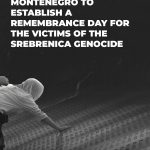
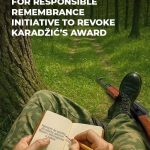



 English
English